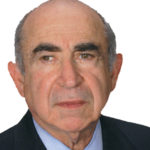2009 Honoree International DI Society
W. Harold Petersen Lifetime Achievement Award.
2015 Honoree of NAILBA’s
Douglas Mooers Award for Excellence.
From time to time we will feature an interview with Eugene Cohen, who has dedicated over 57 years of his life to learning, teaching, and supporting brokers in the agency’s quest to help consumers protect their incomes from the tragic effects of a disability. With the help of Victor Cohen, we will chronicle many of Eugene’s life lessons, advice, strategies, and what drives him every day to mentor those who wish to help their clients protect their incomes. Disability insurance is one of those products that can change the trajectory of an individual and a family’s life and is crucial for every financial planner and insurance professional to learn about and offer to clients.
This is the sixth part of our ongoing series with Eugene Cohen, CEO and founder of the Eugene Cohen Insurance Agency, Inc. The agency started as a disability insurance brokerage MGA and has grown to over 35 team members who are all focused on the wholesale service needs of financial professionals for disability, life, long term care, and annuities.
Victor: Thank you for the time last month. I’d like to continue our conversation, as it was so intriguing. I know I asked you to give just three reasons why you think it’s best to get a first DI policy when young. Is there another reason you haven’t mentioned?
Eugene: Yes. And probably the most important reason to get a DI policy. Young clients–like older clients–need it!
Victor: It seems like many young people–especially in their 20s and early 30s–sometimes have a hard time seeing the need for this important protection. The thought is that health issues and accidents are “older people problems.”
Eugene: Actually, anyone training to be in the field of medicine or law knows how important it is to obtain disability income protection insurance as soon as possible. While studying in these fields, they have seen firsthand how important it is to protect one’s income from unexpected accidents and sickness.
Victor: What about younger, non-medical professionals? How do you get them to see the need for DI?
Eugene: I suggest telling real-life stories about young people who purchased DI policies early in their careers and ended up needing the protection. These stories are easy to find. Just go to the website lifehappens.org. The stories are all right there.
You can read about Michael Sizemore. At 27, Michael and his friends were out one night, crossing the street, when suddenly a drunk driver ran a red light. The car hit Michael, leaving him with such severe head trauma and other injuries doctors didn’t know if he would survive. Michael was placed in an induced coma followed by countless surgeries to repair his shattered legs and to treat his head injuries.
Fortunately, Michael survived and is now getting better. After a lot of rehabilitation he can finally walk again but, during the three years it’s taken Michael to recover, he’s been unable to return to work.
Thanks to a long-term disability insurance policy Michael had through work, Michael’s been able to pay his rent, utilities, and even keep his truck. Michael hopes to go back to work soon, and he credits his disability insurance with helping him through this challenging time.
In this article on lifehappens.org, Michael says, “I’m still rebuilding my life and myself… My disability insurance has been key. I wouldn’t be where I am without it.”
Victor: Being young presents its own unique challenges if an illness or accident were to occur. Many young people have little savings. They couldn’t go very long without income.
Eugene: I purchased my first disability insurance policy at 25 years old. Why? Because even at 25 I knew that I needed to protect my income if something were to happen to me. I was newly married. About to have a kid. How would I pay my rent, take care of my family, without income? I needed that policy as much at 25 years old as I did at 55.
The need for DI is there at any age. At lifehappens.org, there’s the story about Dore Bakouris. At 27, she was newly married, had a one-year-old son and had just returned to work. Suddenly, Dore started having severe headaches. They were so painful she was forced to go to the ER. In the hospital Dore had a CT scan. Doctors told her she had a brain tumor.
After going into surgery, doctors discovered the tumor was actually a cavernous angioma, which is a life-threatening malformation of blood vessels. Dore lost her right peripheral vision and suffered cognitive impairments. Doctors later learned Dore had also suffered a stroke.
Because Dore had purchased income protection insurance before her illness, that disability insurance replaced part of her income. And because Dore had critical illness insurance and suffered a stroke, she was paid out a lump sum.
Thanks to Dore’s early planning she and her husband and child were able to move closer to family for extra support.
Dore says in the article at lifehappens.org, “This insurance has been a miracle for us… It’s helped us in ways I didn’t think were possible.”
In the article Dore’s husband Steven, who happens to be an insurance professional, says that people expect something like this to happen when you’re old or to “other” people. He says, “I want to express how important it is to have this kind of planning in place…your ability to generate income is your largest asset…if you can’t work, where does that leave everything else?”
Victor: And with a two-income household like Dore and Steven’s, having that loss of income can be a big loss.
Eugene: I look at two income households like this. Have you ever seen a teeter-totter? It works great when two people are on it. Right? But what happens when one person gets off? What happens to the other person still sitting on it? That’s what happens to two income households when one of the incomes goes away.
Victor: Income protection insurance keeps the teeter-totter moving.
Eugene: Here’s a final true story I want you to hear—also from lifehappens.org. Bill Reid was 32 years old when he got in a car accident on New Year’s Eve. He ended up with a brain injury that put him in a coma for five weeks. Bill spent about seven months in the hospital and rehab center.
Due to the accident, Bill was left with chronic, short-term memory loss, making it impossible for him to ever work again. Fortunately, Bill got his first disability insurance policy when he was just 26, and he later added more coverage as his earnings went up. When Bill changed jobs and took an employer-paid disability insurance benefit, he very wisely kept his individual coverage for the added protection.
Because of Bill’s smart financial planning his income is roughly the same as it was before the accident and will continue until age 65, allowing him to stay in his home and lead an active life.
You can see from these three stories that these individuals’ lives would have been completely different, financially, if they didn’t have disability income protection.
Victor: I like what you say about disability insurance. It’s like a parachute. It’s better to have it and never need it…than to need it and not have it.
Eugene: That’s exactly right. One of the most valuable first services a producer can offer a young client is educating them on the need for income protection insurance.
Victor: Thank you as always for so generously sharing your knowledge, passion, and experience. I look forward to us talking again, soon!
The stories cited in this article (and more like them) may be found at lifehappens.org.





























